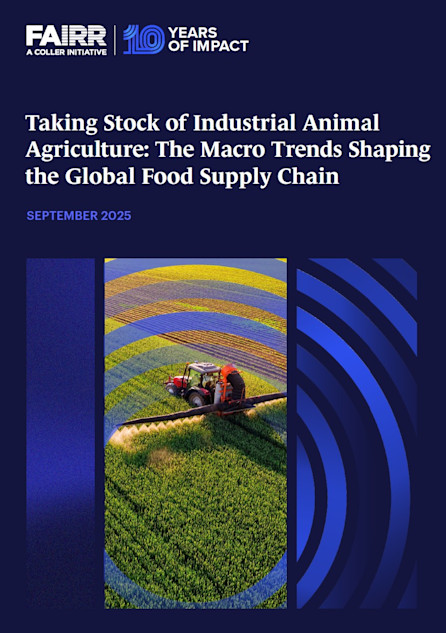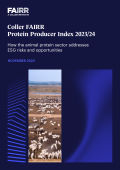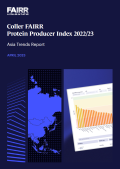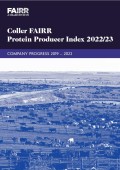Overview
FAIRR has taken stock of how the 60 listed protein producers in the Coller FAIRR Protein Producer Index are managing critical risks and opportunities related to climate and nature, antimicrobial resistance, social issues and protein diversification.
Taking a snapshot of the 2024 data from the seventh Index, this report looks at where tangible company commitments and practices demonstrate progress since the first Index assessments were published in 2019.
It also showcases some of the innovative research, tools and investor engagements that FAIRR has facilitated to equip its investor members with a better understanding of the material risks associated with intensive animal agriculture and opportunities to drive systemic change in the global food system.
This work has not only focused on raising corporate and investor awareness of financial risks tied to issues such as climate change, biodiversity loss and AMR, but on facilitating constructive dialogue with all stakeholders in the agri-food value chain, including policymakers.
2030 represents a pivotal deadline in the global effort to decarbonise economies, industries and systems. While the agri-food sector has made strides in some areas, as this report has demonstrated, it has fallen short of what is needed to achieve a sustainable global food system.
For the past 10 years, harnessing the power of capital markets to drive transformative change has been at the core of FAIRR’s mission – and now, more than ever, with the critical support of investor members, peers, and stakeholders, this work must accelerate and continue into the next decade.
Key highlights
Key findings from this report:
Nearly one-fifth of companies now have an overall low-risk rating, up from 13% in 2023, and from 7% in 2019.
The proportion of companies rated high risk has continued to decrease, at 44% and 45% in 2024 and 2023 respectively, compared to 55% in 2022 and 70% in 2019.
Protein producers have made some progress addressing GHG-related risks, with the proportion rated high risk on climate declining from 77% in 2019 to 43% in 2024.
A significant majority of companies ranked high risk on deforestation, water use and waste and pollution in 2019, ranging from 77% to 90%.
In 2024, that range dropped to 63% - 75%, but most companies are still not adequately managing these risks, particularly in supply chains.
Companies have made substantial progress on antibiotic stewardship since 2019, but this has reversed in the two years to 2024, with 58% ranking as high risk.
Many protein producers are failing to translate human rights commitments into working practices to address such risks.
Written by

Jasmin Leitner
Head of Editorial and Content Production
Jasmin Leitner joined FAIRR in September 2024, as our new Head of Editorial and Content Production. Jasmin will play a key role in working with FAIRR’s Research and Engagements teams to develop engaging content for our investor members and prospects.




